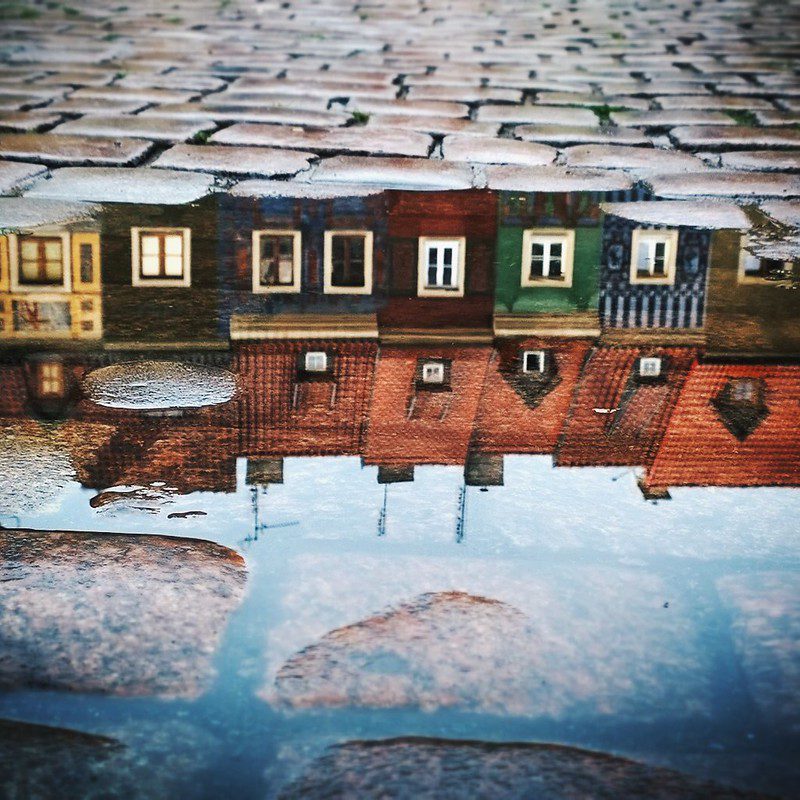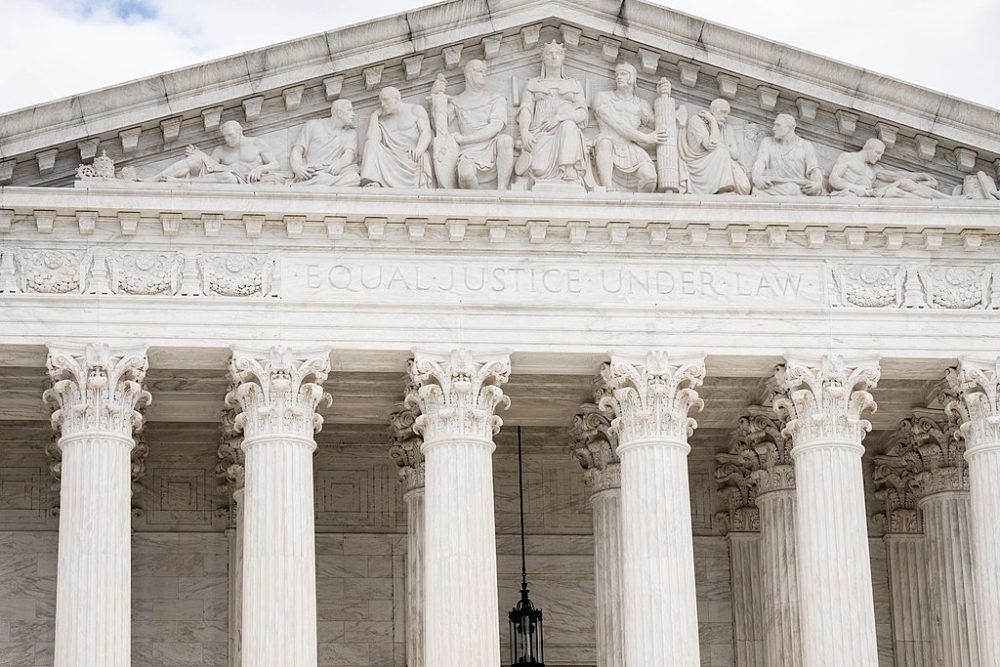
‘Tiny Houses,’ Processed with VSCOcam with hb2 preset. Credit: Michał Koralewski via flickr, CC BY-NC-ND 2.0
In his article last week, Miles Howard explores how trendy “tiny homes” are being pitched as a solution to affordable housing. They are certainly a step up from a shelter bed. However, Howard concludes that fixating on “tiny homes”—whether in villages or wealthier people’s backyards—as a permanent solution to housing affordability is a distraction from generating the political will to actually build sufficient amounts of permanent affordable housing at appropriate densities.
Howard also notes that the concept of a tiny home may appeal more to those who have had problems with having too much space than to those who’ve primarily had too little.
I want to take that idea a step further and argue that tiny houses are a terrible thing to recommend as a permanent housing solution for people who are trying to stabilize their finances and work their way out of poverty.
First, they aren’t as much cheaper as we might think they are. The things that make them livable—customized furniture and non-standard compact appliances and fixtures and plumbing, for example—add significantly to the final cost per square foot, which can be three times higher than usual construction. “When you’re trying to fit an entire home—and everything a person needs to live comfortably—into 400 square feet, you have to be much more conscious of design and function,” notes Brigitt Earley at Apartment Therapy. Being more conscious of design is not a cost-neutral proposition.
If we’re talking homeownership, you often can’t get a mortgage for a tiny home, and you might have trouble getting insurance.
But even beyond these things, there’s a size at which smaller living spaces stop being more efficient and frugal and start being more wasteful. As Caoimhe McKeogh writes in “Stop Telling Your Poor Friends to Try Minimalism,” “Clutter is a way of reducing risk. It is only safe to decide not to own many things if you have the money to buy things as soon as you need them.”
In other words, some level of storage space is not a luxury.
Here are just a fraction of the sort of risk-reducing frugal behaviors that become hard to impossible to do in a tiny home:
- Buying things like food or toiletries in bulk to get a cheaper price or take advantage of a sale.
- Storing hand-me-downs (clothes, shoes, school supplies, books, toys) from older kids (in your immediate family or from extended family and friends) until younger kids grow into them.
- Buying gifts ahead of time at yard sales or when something is on sale.
- Buying small appliances, fixtures, or furniture used or on sale, instead of customized for a very particular space configuration.
- Keeping extras of anything, or anything not immediately or frequently in use—crutches, an extra phone charger, camping supplies, a cooler.
- Having a store of miscellaneous dress-up, cardboard, and craft supplies available for making Halloween costumes instead of buying them.
- Having enough tools and supplies on hand to make basic repairs to your home, possessions, or vehicle.
- Keeping enough food or other emergency supplies on hand for an unexpected period of being homebound by illness or natural disaster.
- Exercising at home instead of paying for classes or a gym membership.
- Having friends and family over instead of socializing at a place where you need to spend money. “Invariably, I meet friends elsewhere, since there aren’t enough places to sit,” writes Fast Company staff writer Adele Peters in “Why I Hate Living in My Tiny House.”
The list could go on and on.
Let’s be clear: I’m not saying that every low-income household ought to do all of the things on that list. Having free time and being able to cover up-front costs in order to get the savings are also big obstacles to doing many of these things. I’m also not saying that any of these things will solve poverty, or that not doing them causes it. That’s a lie perpetuated by people who want to distract from structural causes of inequality. Poverty is a matter of things like exploitative low-wage jobs, extractive capitalism, structural racism, an upside-down tax system, and escalating healthcare and housing costs.
However, when you are already in a difficult financial position because of those larger structural factors, it’s insulting to be told by people who are supposed to be on your side that the solution is to live in such a small space that you lose a whole bunch of choices that might help you survive it.





While a tiny home is not appropriate for a family, and should not be considered for such, they are certainly a partial solution to individual homelessness. Those street people in many communities, California being the one talked about today, do not need anything more than a shelter, and a tiny home gives them that. Now, it does not change their homeless nature, and for that different solutions must be found. A tiny home, with a minimum of toilet facilities and sleeping surface, is a solution for the street people.
Why rule out tiny house villages as an option? For some, regaining a sense of dignity and self-efficacy—the ability to make choices that have meaningful outcomes–is key. For nearly two decades, Dignity Village (Portland Oregon) has succeeded as a self-managed community. The average length of stay is 1.7 years, and 80% move into permanent housing. It is self-financed ($50 per month, accepts donations) and has a contract with the City of Portland for the public land it is on. No one “places” a person in Dignity Village; people apply, and there is a waiting list. It’s certainly not suitable for many, maybe most—but it is right for some. Yes, more permanently affordable housing is the solution (along with raising wages), but why rule out immediate low-cost options that alleviate pain, reduce harm and restore dignity and hope for some?
My intention is not to suggest we rule them out! My point is that people are starting to make the leap to suggesting they are an answer for everyone, and specifically an answer to long-term affordable housing solutions for families, not just as better shelters/transitional spaces, and I see that as short-sighted and problematic for the reasons above. It’s very easy to imagine that a smaller place is better somehow when you are trying to be frugal, and it’s important to point out that after you hit a certain point, it isn’t anymore. By analogy, saying the minimum wage isn’t a living wage doesn’t mean I think the minimum wage isn’t better than nothing. And it’s still true even if some people can get by on the minimum wage.
REACH Advocacy in Rochester NY is planning a Tiny Home Village to increase the supportive housing available in our City. Our tiny homes will be designed to survive in a Rochester winter! We are also planning on have a central building for support services and common meeting space. From our experiences in running winter shelters for the past five years for the chronically homeless we know that there are many of our guests who would do well in this kind of village arrangement. Our social work team who have placed 40% of our guests into some form of permanent housing constantly speak of the paucity of affordable supportive housing here.
I agree that not all are suited to Tiny Homes, but we believe that there are sufficient numbers who will see this as a step up from the street and learn to take pride in their own space. And we believe that we can do this for rents or rent to buy that meets the needs of extremely low income people. Our team is hard at work building the business model and raising money and hopes to begin construction in the near future.
This should be one viable alternative to assist homeless people and families in their transition from homelessness. I would love to followup with your plans/findings and accomplishments.
This sounds to me like a straw-man argument. I’m don’t hear anyone suggesting that tiny-houses are a a good permanent solution to homelessness.
They’re a billion percent better than a dirty blanket under a bridge. Period.
They provide an opportunity to stabilize the risks of chronic damp, sleep deprivation, theft, and assault, while we work on something better. I don’t hear anyone recommending them as a great permanent solution, and I think this article does a disservice to the community by suggesting so.
Absolutely agree that they are a a billion percentage better than a blanket, or even a tent.
I’m glad you haven’t heard anyone suggesting they be a permanent solution, but I have. And in response to this article I’ve heard even more—people telling me about trying to get funding for permanent affordable housing being asked by funders and other stakeholders why don’t they make them tiny homes. So it’s a real problem, sadly. Not universal, thankfully, but I’d rather call it out early before it gets worse.
Just saw a comment in a LinkedIn affordable housing group from a development manager at a large well-known nonprofit: “4d Look into building tiny homes for those that can’t afford to pay $3000 for a one bedroom inside the loop.”
Just one of many many examples.
I disagree that is an example that supports that most people believe “that this is a great permanent supportive housing solution for every homeless people”. We are just fighting to make this be a viable option. We absolutely need a variety of housing options including tiny houses, don’t take away any opportunities. My local community currently doesn’t allow tiny houses to be built at all, we are working on overhauling local code and working with the State legislature to allow tiny houses to even be legally built. Tiny houses should be an option.
There are tiny houses that are stick built or on wheels that are upscale or simple, large (or truly tiny). I live in 840 square feet and my house is considered tiny. My neighbor raised two kids in 640 square feet. I consider a tiny house more than a temporary unheated shelter which is TEMPORARY. In contrast Emerald Village in Eugene, Oregon is a tiny house village for people who are rent-burdened. Architects designed each house, volunteers (for the most part) built the structures. The city, neighborhood association, and a non-profit all collaborated to make it happen. Homes are first offered to neighborhood residents where rents have skyrocketed along with the “coolness” factor of the neighborhood. Some residents were homeless, others just priced out of housing. https://www.squareonevillages.org/emerald Sponsors, Inc. just opened a tiny house village too for people who are “homeless and low-income post incarceration”. https://sponsorsinc.org/tiny-home-village/
Miriam, I’m disappointed in the coverage that ‘tiny houses’ have gotten in Shelterforce. A couple of points I would like to make. The first is that there is no common definition of tiny houses. LIHI in Seattle is using structures that do not meet building codes as a crisis response. As you said and as we agree, this is important work and better than a tent. Other providers, such as Quixote Communities in Olympia, WA have build permanent dwelling units with plumbing, heating, insulation, etc. as a form of permanent supportive housing. Quixote Communities dwelling units are not that different from SRO’s which is something the affordable housing community went to great lengths to preserve. Community Frameworks was the development consultant on Quixote Village and is working with them on future projects following the permanent supportive housing model. We do not think this is a solution for everyone, but we think that it should be a tool in the toolbox for community developers and the affordable housing industry. Here is a link to a white paper drafted back in 2015 about tiny houses that we feel might still be valuable to the affordable housing community https://communityframeworks.org/tiny-house-white-paper/
The boarding house used to play the role which is now played by the tiny house. It used to be that when people first moved to the city they could reliably and inexpensively find community, lodging, and meals in boarding houses. Homelessness really only arose after regulators began to make decrees such as that boarding houses were only allowed to house a few unrelated individuals, that studio apartments had to have a certain minimum size, and so on. Simply eliminating some of the zoning law and building codes would make the tiny house unnecessary.
As well one might point out that the conventional house with its lawn, ‘formal’ dining room, ‘formal’ living room, and so on intentionally squanders space as a way of signifying bourgeois status – functions as a social marker which these days most people – even those who can afford them – no longer care about. And I need hardly say that the point is not to deny the pretense of bourgeois status to the poor, but merely to point out that what the poor so desperately need is functional practical space conducive to dealing with life’s necessities.
It’s a solution for some people. It’s not a solution for everyone. The matter of housing is as diverse and unique as people are. All solutions have to be on the table. There is no silver bullet and there are no silver bullets – sorry to say. It’s not a simple problem. The reasons for it are not the same, the solutions to it are not the same. People and their situation, they themselves, their culture, their needs and the environment they’re in are not the same. We can’t assembly line hosing solutions. That’s a hard truth people have to come to understand. It’s going to take work. Its a societal matter that can’t be assigned or outsourced.